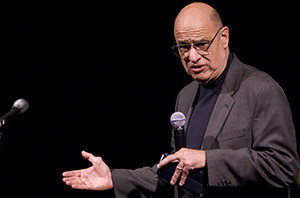A Doubter’s Parish reader recently wrote, “How did Christianity become so mean? How did we get from Jesus’ message of love to relentless condemnations against gays, transgender persons, women preachers, immigrants, scientists, educators, journalists and public-school librarians?” She said, “When I look at American Christianity in 2024, I feel like I’m watching the 2004 film Mean Girls.” She vividly concluded, “If Jesus came to America and looked at the meanness in his church, he would puke.”

Martin Thielen
This woman joins a multitude of others who feel alarmed over today’s mean-spirited Christianity. For example, pastor Brian Zahnd laments that large numbers of evangelical Christian leaders are fomenting hostility among their followers. He warns them: “You are forming your people in anger and hate. You are helping to intensify their capacity to hate other people. You are giving them permission to carry around this permanent rage.”
Mean Christianity
Examples of this “permanent rage” abound. For example, in his book The Kingdom, the Power and the Glory: American Evangelicals in an Age of Extremism, Tim Alberta tells a story about David French and his wife, Nancy, who were ostracized by their evangelical friends after they opposed Donald Trump.
In response to these unpardonable evangelical sins, French received death threats. False and malicious stories surfaced on the internet about his wife having sex with groups of Black men. And photoshopped images of his youngest daughter, who was adopted from Ethiopia, were posted online, depicting her awaiting execution inside a gas chamber. Donald Trump, dressed in a Nazi SS uniform, was shown with his finger on the ignition button.
“Tragically, most of this vicious hatred against David French and his family came from people who claim to follow Jesus.”
Tragically, most of this vicious hatred against David French and his family came from people who claim to follow Jesus. Even people at his church ostracized French. Members regularly and hostilely confronted him about his writings. Some members literally turned their backs on the French family when they saw them at church.
And while a large percentage of this cruelty comes from evangelicals, mean Christianity is not limited to the Religious Right. For example, over the past decade, I have watched in horror as members of my own tribe, the United Methodist Church, have viciously condemned one another over LBGTQ issues. Twenty-five percent of UMC churches already have left the denomination over this conflict, with more departures to come. The battle has been exceptionally ugly, including character assassination and disinformation campaigns on both sides of the debate. This deeply unchristian behavior makes me embarrassed to be a United Methodist.
So, how did Christianity become so mean? Although many factors contribute to mean Christianity, the primary culprit is that large numbers of American Christians, both Republicans and Democrats, care more about partisan politics and culture wars than they care about following the example and teachings of Jesus.
A kinder Christianity
Twenty-first century America desperately needs a kinder Christianity. Thankfully, we don’t need to look far for guidance. For example, the book of Ephesians says, “Get rid of all bitterness, rage and anger, brawling and slander, along with every form of malice. Be kind and compassionate to one another, … and walk in the way of love.”
“The only antidote to mean Christianity is love.”
Although it sounds naïve in today’s bitter and polarized environment, the only antidote to mean Christianity is love. It doesn’t mean as religious people we won’t have strong disagreements over important issues. We will. It doesn’t mean we shouldn’t stand up for what we believe is right. We should. And it doesn’t mean we shouldn’t challenge religion we think is unhealthy. We must. Jesus certainly challenged the toxic religion of his day. However, we should do these things in a spirit of humility, kindness, respect and love.
This shouldn’t be so difficult for people who claim to follow a man who exhibited grace, mercy, kindness, love, respect, forgiveness and compassion. In a nutshell, the core message of Jesus was to live a life of love. Two thousand years ago, in a world with plenty of its own mean religion, Jesus offered a better way. Rather than condemning perceived enemies of God like tax collectors, prostitutes and other sinners, Jesus loved them. And he instructed us to do the same. Which reminds me of one of my favorite stories.
Party for a prostitute
Years ago, well-known author and speaker Tony Campolo traveled to Honolulu to speak at a conference. Upon arriving, Tony went to his hotel and fell asleep. He woke at 9 a.m. his time, but in Honolulu it was 3 a.m. Wide awake and hungry, Tony walked to a small diner near the hotel and ordered coffee and a doughnut. At 3:30 a.m., a group of provocatively dressed prostitutes walked in the door. Their loud and crude talk made Tony uncomfortable, so he prepared to leave.
But then he heard one of the women say, “Tomorrow’s my birthday. I’m going to be 39.”
Her friend responded, “So, what do you want from me, a birthday party? You want me to get you a cake and sing ‘Happy Birthday’?”
“Come on!” said the woman. “Why do you have to be so mean? I was just telling you, that’s all. I don’t want anything from you. I mean, why should you give me a birthday party? I’ve never had a birthday party in my whole life. Why should I have one now?”

Tony Campolo
When Tony heard those words, he made a decision. He stayed in the diner until the women left. Then he said to the owner, “Do they come in here every night?”
“Yeah,” he said, “You can set your clock by it.”
Tony said, “What’s the name of the woman who sat next to me?”
“That’s Agnes,” he replied.
Tony said, “What do you think about us throwing a birthday party for her — right here — tomorrow night?”
A smile crossed the owner’s face, and he said, “That’s great! I like it! I’ll even make the cake.”
At 2:00 the next morning, Tony went back to the diner. He put up crepe paper decorations and a big sign that said, “Happy Birthday, Agnes!” The workers at the diner obviously got the word out because by 3:15 just about every prostitute in Honolulu crowded into the place. At 3:30 sharp, the door swung open, and in came Agnes and her friends.
Tony had the entire group scream, “Happy Birthday, Agnes!” Agnes, absolutely stunned, felt so overwhelmed her friend had to hold her up. Everyone in the diner began to sing, “Happy birthday to you.”
“You never told me you were a preacher. What kind of church do you belong to?”
When they brought out the cake covered with 39 candles, Agnes began to cry. Too overcome with emotion to blow out the candles, she let the owner of the diner blow them out for her. Before she cut the cake, Agnes hesitated. She asked if she could take her cake down the street, show it to her mother, and then come right back. The owner of the diner said that would be fine, so she did.
When the door closed behind Agnes, silence filled the diner. Tony broke the silence by saying, “What do you say we pray?” It probably seemed a strange thing for a roomful of prostitutes to bow their head in prayer, but that’s what happened. Tony prayed for Agnes and for the other prostitutes in the diner, affirming that they were beloved daughters of God with great value, worth and promise.
When Tony finished the prayer, the owner of the diner said, “You never told me you were a preacher. What kind of church do you belong to?”
In a moment of divine inspiration, Tony said, “I belong to a church that throws birthday parties for prostitutes at 3:30 in the morning.”
Today, perhaps more than ever before, we need churches and Christians who throw parties for prostitutes, tax collectors and other sinners (including you and me) rather than condemning them. In short, we need kind Christians, not mean Christians. May that be true in your life and in mine. Amen.
Martin Thielen, a retired minister, is the creator and author of www.DoubtersParish.com.


